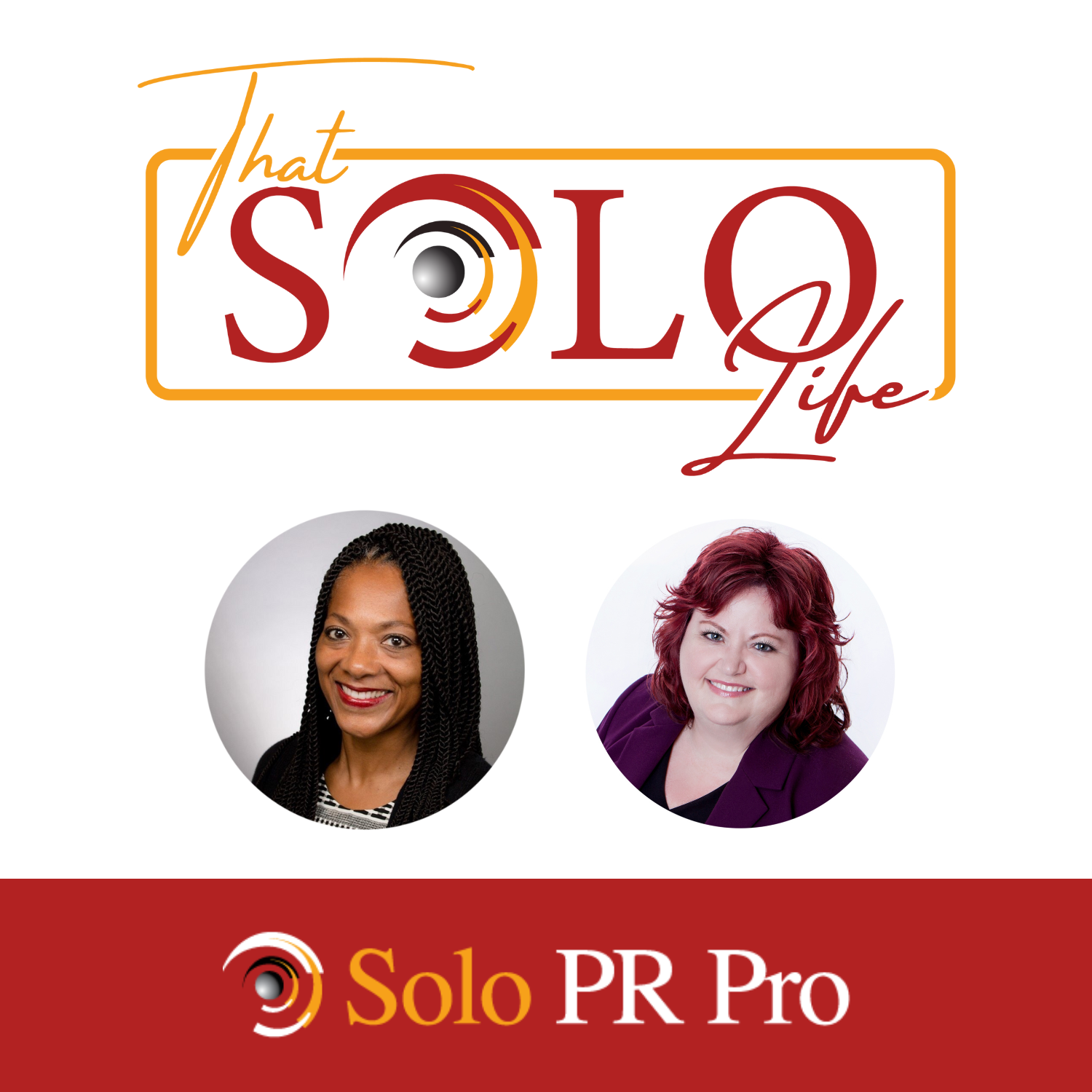
31.2K
Downloads
332
Episodes
That Solo Life: Co-hosted by Karen Swim, founder of Words for Hire, LLC and owner of Solo PR Pro and Michelle Kane, founder of VoiceMatters, LLC, we keep it real and talk about the topics that affect solo business owners in PR and Marketing and beyond. Learn more about Solo PR Pro: www.SoloPRPro.com
That Solo Life: Co-hosted by Karen Swim, founder of Words for Hire, LLC and owner of Solo PR Pro and Michelle Kane, founder of VoiceMatters, LLC, we keep it real and talk about the topics that affect solo business owners in PR and Marketing and beyond. Learn more about Solo PR Pro: www.SoloPRPro.com
Episodes
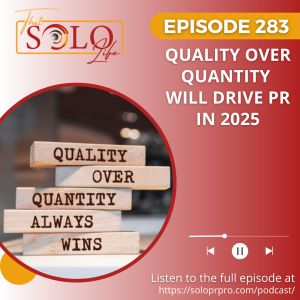
Monday Jan 20, 2025
Quality Over Quantity Will Drive PR In 2025
Monday Jan 20, 2025
Monday Jan 20, 2025
That Solo Life, Episode 283: Quality Over Quantity Will Drive PR In 2025
In This Episode
In this episode of That Solo Life, co-hosts Karen Swim and Michelle Kane dive into the critical topic of gaining access to the C-suite and the importance of building meaningful relationships within organizations. Communication professionals understand that their effectiveness hinges on the quality of information and insights they can gather from various levels of an organization, particularly from executive leadership.
The conversation kicks off by acknowledging the challenges communicators face in accessing the C-suite, often due to internal politics or organizational structures that can block our paths. The hosts emphasize the necessity of having a seat at the table, as it not only enriches engagements but also leads to better compensation. However, Karen and Michelle recognize that this access is not always straightforward, and discuss creative strategies to navigate these barriers.
One approach suggested is initiating dialogue with your primary contacts, such as the CMO, by asking pointed questions about their goals and recent developments within the organization. This step-ladder approach allows you to gradually build rapport and gain insights that can inform your strategies. Michelle and Karen also stress the importance of aligning your efforts with the broader business objectives and speaking the language of our marketing counterparts to foster collaboration.
Throughout the episode, the hosts highlight the shift in focus from quantity to quality in PR work. Listeners are encouraged to ask quality questions and engage in deeper conversations that matter to the business, rather than simply relying on traditional metrics.
As the episode wraps up, Karen and Michelle reflect on the importance of building trust—not only with your external audiences but also internally with clients. They emphasize that meaningful relationships are at the core of successful communication strategies, and challenge our listeners to prioritize this in their work moving forward.
Join us as we explore these themes and share insights that can help you navigate the complexities of working with clients and organizations in the ever-evolving landscape of PR and marketing. Don't forget to check out Solo PR Pro for community support and resources tailored for solo practitioners. Thank you for tuning in, and we look forward to connecting with you in our next episode!
Episode Timeline
00:00:00 - Introduction to That Solo Life
00:00:12 - Accessing the C-Suite
00:01:05 - The Importance of Influence
00:02:03 - Navigating Internal Politics
00:03:13 - Starting the Dialogue
00:04:06 - Aligning Goals with Clients
00:05:04 - Understanding Reporting Metrics
00:06:57 - The Separation of Marketing and PR
00:08:11 - Quality Over Quantity in Results
00:09:38 - Shifting Focus in the Post-Pandemic Era
00:10:47 - Building Meaningful Connections
00:12:30 - The Importance of Thoughtful Engagement
00:14:49 - Forging Trusting Relationships
00:15:25 - Conclusion and Community Invitation
Enjoyed the episode?
Please leave a review here - even a sentence helps. Share and tag us (@SoloPR, @SoloPRPro) on social media so that we can thank you personally!
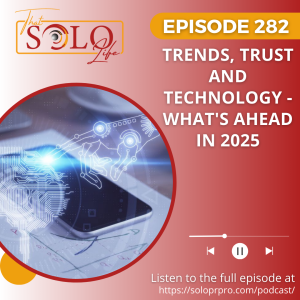
Monday Jan 06, 2025
Trends, Trust And Technology - What's Ahead In 2025
Monday Jan 06, 2025
Monday Jan 06, 2025
That Solo Life, Episode 291: Trends, Trust And Technology - What's Ahead In 2025
In This Episode
Join us for Part Two of our PR Trends discussion In this episode of That Solo Life. Co-hosts Karen Swim and Michelle Kane continue their discussion on the trends they believe will shape the public relations and communications landscape in 2025. We dive into analytics, trust, technology and the predicted trends that are still struggling to catch on.
We kick off the discussion by emphasizing the need for PR professionals to harness data analytics more effectively. Drawing from our recent conversation with Lisa Gerber, we explore how metrics can guide us in crafting compelling narratives that resonate with the right audiences. We highlight the shift from merely reporting performance to using data to inform our storytelling strategies, ensuring that our content not only reaches but engages our target demographics.
Next, we address the critical issue of trust-building. In a world where skepticism is rampant, we stress the importance of transparency and authenticity in brand communications. We discuss how PR can play a pivotal role in fostering trust through proactive crisis management and consistent messaging that aligns with a brand's mission and values.
As we transition into a discussion about technology, we reflect on the anticipated rise of augmented reality (AR) and immersive experiences. While we initially expected these innovations to be more prevalent by now, we acknowledge the human element—our innate desire for genuine interaction—that has tempered their adoption. We explore the barriers to embracing these technologies and the need for accessibility to drive widespread acceptance.
Throughout the episode, we encourage our listeners to think critically about the trends shaping our industry and to remain adaptable as we navigate the complexities of the modern communications landscape. We invite you to share your thoughts and insights, and as always, we appreciate your support in spreading the word about That Solo Life. Join us as we look forward to an exciting year ahead in PR and marketing!
Episode Timeline
00:00:00 - Introduction to Predictions for 2025
00:00:31 - Data-Driven Storytelling in PR
00:02:27 - Engagement Metrics and Quality Over Quantity
00:05:15 - The Importance of Trust-Building
00:09:17 - Transparency and Authenticity in Branding
00:10:00 - The Slow Adoption of AR and Immersive Experiences
00:12:12 - Human Behavior and Technology Adoption
00:15:51 - Conclusion and Call to Action
Resources:
- The Power of Storytelling in an AI World
- PRSA: Looking Ahead: 4 PR Challenges to Tackle in 2025 — and How to Prepare Now
Enjoyed the episode?
Please leave a review here - even a sentence helps. Share and tag us (@SoloPR, @SoloPRPro) on social media so that we can thank you personally! Your support helps us keep bringing you insightful content every week. Thank you for tuning in!
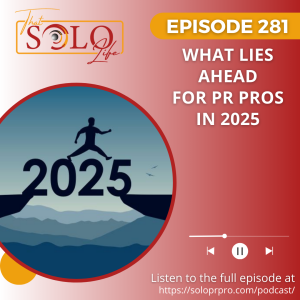
Monday Dec 30, 2024
What Lies Ahead For PR Pros In 2025
Monday Dec 30, 2024
Monday Dec 30, 2024
That Solo Life, Episode 281: What Lies Ahead For PR Pros In 2025
In This Episode
In this episode of That Solo Life, co-hosts Karen Swim and Michelle Kane pause to reflect on what trends will shape the landscape for PR professionals in 2025.
The hosts kick off the discussion by addressing the importance of cross-cultural sensitivity, especially in light of recent setbacks in Diversity, Equity, and Inclusion (DEI) initiatives. Despite the political climate and the dismantling of formal programs, they emphasize that the need for effective communication with diverse audiences remains critical. As communicators, we must advocate for inclusive brand guidelines and storytelling that resonates with all segments of our audience.
The conversation then shifts to the significance of enhanced internal communications. Karen and Michelle highlight how transparent communication fosters trust within organizations, especially in a hybrid work environment. Drawing from personal experiences, they stress the value of keeping employees engaged and informed, as this is essential for maintaining a cohesive and motivated workforce.
The hosts then explore the evolving role of influencer partnerships in 2025. Influencers are here to stay, and Michelle and Karen discuss how they can bring creativity and authenticity to brand messaging. Michelle shares insights from a recent panel featuring local influencers, who expressed their commitment to ethical practices and delivering quality work for their clients. This creativity is something we hope to see more of in the coming year, as it can help break the monotony of corporate jargon and reinvigorate our communications.
The episode wraps us with hope for a more optimistic and joyful 2025. The hosts acknowledge the challenges that lie ahead, including issues of trust and misinformation, but believe that these challenges will ultimately highlight the value of skilled PR professionals. Our goal as PR professionals is to help brands navigate these turbulent times and connect with their audiences in meaningful ways.
Thank you for joining us on this journey, and we look forward to continuing the conversation in our next episode!
Episode Timeline
00:00:00 - Introduction to Trends for 2025
00:00:18 - The Importance of Cross-Cultural Sensitivity
00:02:50 - The Need for Enhanced Internal Communications
00:05:00 - The Role of Trust in Organizations
00:07:30 - Influencer Partnerships and Creativity
00:10:15 - Looking Ahead with Optimism
00:11:28 - Conclusion and Call for Listener Engagement
Enjoyed the episode?
Please leave a review here - even a sentence helps. Share and tag us (@SoloPR, @SoloPRPro) on social media so that we can thank you personally!

Monday Dec 23, 2024
Magic Wands And Flying Carpets - The Myths And Realities Of PR
Monday Dec 23, 2024
Monday Dec 23, 2024
That Solo Life, Episode 280: Magic Wands And Flying Carpets - The Myths And Realities Of PR
In This Episode
The understanding about the role of Public Relations can vary widely from being a vanity function to having the ability to save a failing company. In this episode of That Solo Life, co-hosts Karen Swim, APR and Michelle Kane engage in a lighthearted yet serious discussion about the common misconceptions about public relations (PR) and the challenges faced by PR professionals and the businesses they serve.
There are things that PR simply cannot fix. Karen and Michelle share their experiences with clients who have high expectations, believing that PR can be a magic bullet for their failing businesses. While PR can certainly help, it cannot replace the need for a solid business foundation, infrastructure, and consistent effort.
Karen highlights the issue of companies that underestimate the value of PR, especially during leadership changes. New CMOs may not recognize the critical role PR plays in maintaining brand reputation and driving customer trust. Without a partnership between PR and marketing, businesses risk losing out on valuable opportunities.
Michelle adds that PR cannot compensate for a lack of effort from clients. We need their input and collaboration to create effective strategies. The misconception that PR is a "set it and forget it" service leads to disappointment and missed opportunities. There must be open communication and consistent engagement to achieve the best results.
In addition to navigating these challenges, Karen and Michelle express concern for the well-being of PR professionals who are feeling burned out and disillusioned. The lack of communication and feedback from potential clients can be disheartening, and listeners are urged to foster better communication practices.
In closing, we extend our heartfelt gratitude to our listeners for their support throughout the year. We encourage everyone to approach their PR efforts with an open mind and a clear understanding of how collaboration can lead to success. We wish everyone happy holidays and look forward to continuing this journey together in 2025, sharing insights, laughter, and valuable information. Thank you for tuning in to That Solo Life!
Episode Timeline
00:00:00 - Introduction to That Solo Life
00:00:22 - The Holiday Season and PR Challenges
00:01:01 - Things PR Cannot Fix: Failing Businesses
00:01:48 - The Misconception of PR 's Value
00:03:46 - The Importance of Storytelling in PR
00:05:47 - The Need for Client Effort in PR
00:07:51 - Consistency is Key in PR Efforts
00:09:44 - The Passion of PR Professionals
00:10:49 - The Importance of Communication and Feedback
00:12:22 - The Impact of Disillusionment in the PR Industry
00:14:44 - Closing Thoughts and Holiday Wishes
Enjoyed the episode?
Please leave a review here - even a sentence helps. Share and tag us (@SoloPR, @SoloPRPro) on social media so that we can thank you personally!

Monday Dec 16, 2024
The Power of Storytelling in an AI World
Monday Dec 16, 2024
Monday Dec 16, 2024
That Solo Life, Episode 279: The Power of Storytelling in an AI World
In this Episode
A dying man walks onto a stage and opens his talk with photos of his CAT scans and in seconds has the entire room in laughter. Professor Randy Pauch gave this TED Talk and it still serves as a powerful example of the power of stories. In this episode of That Solo Life, we welcome back story strategist, Lisa Gerber of Big Leap Creative to talk about storytelling and why it matters more than ever.
We kick off the conversation by discussing the power of storytelling in business. Lisa shares her insights on why leading with a story is crucial, emphasizing that stories set the tone and energy of any interaction. They capture attention and create emotional connections, which are essential for building relationships. Lisa explains how starting with a personal story can ease nerves for both the storyteller and the audience, making the experience more enjoyable and memorable.
As we delve deeper, we explore the barriers that prevent people from making emotional connections through storytelling. Lisa highlights the common misconception that personal stories should be avoided in professional settings. She encourages listeners to embrace their personal narratives, as they can foster deeper conversations and connections. We also touch on the importance of understanding the audience's perspective and tailoring messages accordingly, especially in a world where communication can often feel fragmented.
In light of the current polarized climate, we discuss the challenges communicators face when trying to connect with diverse audiences. Lisa emphasizes the need for curiosity and open-mindedness, urging us to seek to understand differing viewpoints rather than jumping to judgment. We reflect on the importance of acknowledging our cognitive biases and the role of storytelling in bridging divides.
Towards the end of the episode, Lisa shares exciting news about her upcoming book, The Power of Story, which aims to help individuals communicate in a relatable and impactful way. We also discuss her podcast, Breaking Trail , which features stories of leaders who are forging their own paths.
As we wrap up, Lisa leaves us with a powerful nugget of inspiration: to start sharing our personal stories in less risky environments to see how people respond. This practice can help us connect more authentically and stand out in our professional lives.
Join us for this enlightening conversation filled with valuable insights on storytelling, connection, and the importance of being true to ourselves in our professional journeys. Don't forget to check the show notes for links to Lisa's upcoming book and her website, where you can connect with her directly. Thank you for listening to That Solo Life!
About Lisa Gerber
Lisa Gerber is a story strategist and communications expert who works with purpose-driven leaders to help them communicate to connect. Through storytelling, leaders build trust, alignment, and understanding. With a storytelling habit, they become influential leaders. Lisa has been in PR and communications for the past 20+ years and has spent the past decade thinking about how stories help us be better at relationships in life and work. (Hint: it’s about being real, relatable, and riveting.) She is the author of From So What? To So Funded: How nonprofits use story to create impact and change the world. Her latest book, released in December 2024 is The Power of Story.
You can book a consult with Lisa via her website or connect with her on LinkedIn.
Episode Timeline
00:00:00 - Introduction to That Solo Life Podcast Welcome and introduction of hosts and guest Lisa Gerber.
00:01:05 - The Power of Storytelling Discussion on the importance of leading with story in communication.
00:02:30 - Creating Emotional Connections Exploration of how storytelling fosters emotional connections in business.
00:05:24 - Barriers to Storytelling Identifying barriers that prevent effective storytelling and emotional connection.
00:06:40 - The Role of Personal Stories The significance of sharing personal stories in professional settings.
00:08:10 - Navigating Vulnerability Addressing the fear of revealing personal experiences in a professional context.
00:10:22 - Understanding Your Audience The importance of tailoring messages to meet the audience's needs.
00:11:52 - Communicating in Polarized Times Tips for storytelling in a fragmented and polarized environment.
00:14:59 - The Importance of Curiosity Encouraging open-mindedness and curiosity in conversations.
00:18:08 - The Role of Truth in Communication Discussing the necessity of truth in building relationships.
00:19:50 - AI and Human Connection The limitations of AI in creating genuine human connections through storytelling.
00:22:02 - Lisa 's Upcoming Book Announcement of Lisa's new book, "The Power of Story."
00:25:04 - Final Inspiration Encouragement to share personal stories and connect authentically.
00:26:20 - Lisa 's Podcast: Breaking Trail Information about Lisa's podcast and its focus on leadership stories.
00:28:06 - Closing Remarks Wrap-up of the episode and invitation for listener engagement.
Resources:
- Randy Pausch TED Talk: Really Achieving your Childhood Dreams
- Lisa’s latest book: The Power of Story
- Storytelling Workshop
- David Brooks Podcast: Aspen Ideas
- Podcast: Breaking Trail
- Heineken Ad: Worlds Apart
Enjoyed the episode?
Please leave a review here - even a sentence helps. Share and tag us (@SoloPR, @SoloPRPro) on social media so that we can thank you personally!
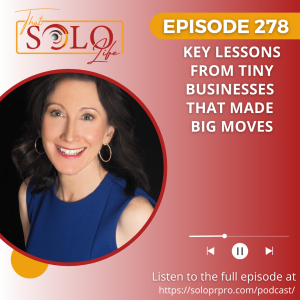
Monday Dec 09, 2024
Key Lessons from Tiny Businesses that Made Big Moves
Monday Dec 09, 2024
Monday Dec 09, 2024
That Solo Life, Episode 278: Key Lessons from Tiny Businesses that Made Big Moves
In this Episode
In this episode of That Solo Life, co-hosts Karen Swim, APR and Michelle Kane welcome Elaine Pofeldt, an independent journalist and speaker specializing in entrepreneurship and careers. Elaine is the author of, The Million Dollar One-Person Business and Tiny Business, Big Money.
The conversation kicked off with a discussion about the evolving landscape of work, particularly the significant role that artificial intelligence (AI) is playing in the business today. Elaine shared her observations on how public relations professionals and marketers are increasingly embracing AI tools, likening this shift to the early days of cloud computing. She emphasized that AI is making business operations more accessible, allowing solo entrepreneurs to streamline workflows and reduce administrative burdens.
As we delved deeper, Elaine highlighted the importance of leveraging technology and outsourcing tasks to enhance productivity. She noted that successful tiny business owners often utilize contractors and standard operating procedures to maintain efficiency. This approach allows them to focus on their core competencies while ensuring that their businesses run smoothly.
Elaine also shared valuable insights gleaned from her interviews with successful entrepreneurs. She emphasized the significance of resilience, adaptability, and the willingness to pivot in response to changing market demands. Many of the entrepreneurs she spoke with have diversified their income streams and continuously reassess their business strategies to stay relevant.
The importance of mindset was a key theme of the episode. Elaine pointed out that the battles we face in business often begin in our minds. She encouraged our listeners to embrace a growth mindset, persist through challenges, and not let rejection deter them from pursuing their goals. The episode also touches on the necessity of building strong relationships and maintaining a network, as these connections can lead to unexpected opportunities.
Towards the end of the episode, we explored the concept of creating a sustainable revenue mix. Elaine advised our listeners to understand their financial needs and develop a clear picture of their baseline costs, both personally and professionally. She stressed the importance of cash flow management and the need for ongoing business development efforts.
In closing, we agreed that the journey of an independent professional is filled with ups and downs, but with the right mindset, tools, and community support, we can navigate these challenges successfully. Elaine's insights were not only inspiring but also practical, providing our audience with actionable takeaways to implement in their own businesses.
Episode Highlights
The key insights gleaned from the successful entrepreneurs that Elaine Pofeldt spoke with include:
- They don't do all the work of the business themselves, but leverage technology and contractors to handle tasks
- They have standard operating procedures documented to train others and streamline processes
- They consistently show up and do what they say they will do, even on difficult days
- They are resilient and not afraid to pivot, adapting their skills and services as demand changes
- They know their strengths and bring their personality to their business, rather than hiding behind a corporate facade
- They focus on building trust and collaboration with clients and media, rather than acting as an all-knowing expert
- They ensure they have a mix of recurring revenue and new business development to maintain a sustainable business through economic cycles
About Elaine Pofeldt
Elaine Pofeldt is an independent journalist and engaging speaker known for her expertise in entrepreneurship, freelance success, and the evolving landscape of the workforce.. She is the author of “The Million-Dollar One-Person Business” and “Tiny Business Big Money.”With a comprehensive background in journalism and a passion for exploring how individuals can thrive in their careers, she captivates audiences by sharing valuable insights and practical advice. Elaine's workshops and talks often focus on the importance of building sustainable business models and leveraging freelance opportunities in today's economy. Her approachable style and depth of knowledge resonate with professionals seeking to enhance their skills and navigate the complexities of modern work. You can book Elaine via her website or connect with her on LinkedIn.
Episode Timeline
00:00:00 - Introduction to That Solo Life Podcast Welcome and introduction of hosts and guest Elaine Pofeldt.
00:01:00 - The Importance of AI in Business Discussion on the growing trend of AI usage among publicists and marketers.
00:02:30 - Leveraging AI for Business Efficiency How tiny businesses are utilizing AI to streamline workflows and improve productivity.
00:04:30 - AI Tools for Content Creation Exploration of various AI tools and their applications in content creation and marketing.
00:11:00 - Insights from Successful Entrepreneurs Key takeaways from interviews with entrepreneurs featured in Elaine's books.
00:12:30 - Common Traits of Successful Entrepreneurs Discussion on the habits and mindsets that contribute to the success of independent business owners.
00:16:00 - Adapting to Economic Changes How entrepreneurs can create sustainable businesses amidst economic fluctuations.
Resources:
- The Million Dollar, One Person Business; Purchase the Book on Amazon
- Elaine Pofeldt speaker website
- Tiny Business, Big Money
- New course on writing for major publications
- Live pitch-the-media workshops
Enjoyed the episode?
Please leave a review here - even a sentence helps. Share and tag us (@SoloPR, @SoloPRPro) on social media so that we can thank you personally! Your support helps us keep bringing you insightful content every week. Thank you for tuning in!
Say Thanks to Elaine Pofeldt
If you liked this episode with Elaine Pofeldt please say thanks on LinkedIn!
Listen to the episode on our website, Apple Podcasts, Spotify, Amazon Music, or on your favorite podcast platform. You can also watch the interview on YouTube here.

Monday Dec 02, 2024
That Solo Life Episode 277: Quick Things to Check Off Before the Year Ends
Monday Dec 02, 2024
Monday Dec 02, 2024
That Solo Life, Episode 277: Quick Things to Check Off Before the Year Ends
In This Episode
In this episode of That Solo Life , Karen Swim, APR and Michelle Kane discuss a few simple tasks that solo business owners need to consider as the year comes to a close.
The co-hosts kick off the discussion with information about the Corporate Transparency Act and the necessity for business owners to complete their BOI filing. Karen emphasizes the ease of the process, sharing her own experience and encouraging listeners not to overlook this important legal requirement. Karen and Michelle also touch on the significance of health insurance during this time of year, urging our audience to consult with insurance brokers to find better plans that suit their needs and potentially save them money.
Transitioning into broader industry discussions, they address the noticeable decline in viewership for major news outlets and the cultural shift towards mental self-care. The co-hosts explore how this trend impacts PR professionals and the challenges they face in reaching audiences who are increasingly disengaged from traditional media. Karen highlights the need for creativity and agility in our communication strategies, suggesting that we look beyond conventional methods to connect with our clients and their audiences.
In the episode, Michelle and Karen also discuss the importance of community building in our marketing efforts. With people feeling more isolated than ever, they emphasize the value of creating spaces for connection and engagement. Whether through local events or user groups, listeners are encouraged to think about how they can foster community.
The episode wraps up with a reminder of the actionable steps you can take before the year ends, including completing your BOI filing and securing appropriate health insurance. Listeners are invited to share their thoughts and ideas for future topics, reinforcing the sense of community within the solo PR profession.
Join us for this insightful conversation as we navigate the challenges and opportunities that lie ahead in 2025 and beyond. Don't forget to check out Solo PR Pro for more resources and support in your solo journey!
Episode Timeline
00:00:00 - Introduction to That Solo Life Podcast Join Michelle Kane and Karen Swim as they kick off the episode, discussing the countdown to the end of the year.
00:01:00 - Corporate Transparency Act and BOI Filing A discussion on the importance of the BOI filing under the Corporate Transparency Act and tips for completing it efficiently.
00:03:30 - Health Insurance Tips for Solopreneurs Karen shares insights on the benefits of working with an insurance broker to find better health insurance plans.
00:06:30 - The Impact of News Consumption on PR Exploration of the decline in news viewership and its implications for PR professionals in reaching audiences.
00:09:30 - Challenges in Media Engagement Discussion on the difficulties of engaging audiences who are tuning out traditional media sources.
00:12:00 - Creative Approaches to Storytelling The importance of storytelling in PR and how to connect with audiences on a personal level.
00:15:00 - Building Community and Engagement Strategies for creating community connections and engaging customers beyond traditional marketing methods.
00:17:30 - Conclusion and Call to Action Wrapping up the episode with reminders for listeners to complete their BOI filing and health insurance tasks, and encouraging community engagement.
Resources:
- Beneficial Ownership Information - Online quiz and filing
- Health Care information for the self-employed: Healthcare.gov
Enjoyed the episode?
Please leave a review here - even a sentence helps. Share and tag us (@SoloPR, @SoloPRPro) on social media so that we can thank you personally! Your support helps us keep bringing you insightful content every week. Thank you for tuning in!
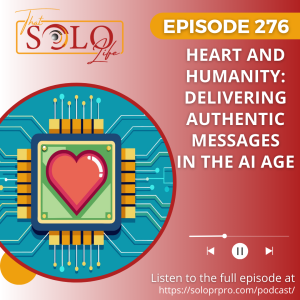
Monday Nov 25, 2024
Heart And Humanity: Delivering Authentic Messages In the AI Age
Monday Nov 25, 2024
Monday Nov 25, 2024
That Solo Life, Episode 276: Heart And Humanity: Delivering Authentic Messages In the AI Age
In this Episode
In this episode of That Solo Life, co-hosts Karen Swim, APR and Michelle Kane dive into the intersection of technology, nostalgia, and the human experience, particularly in the context of recent advertising trends and societal shifts.
The conversation kicks off with discussion about a recent Coca-Cola commercial that was created using AI technology. The hosts note that the commercial has been criticized by some viewers as being "creepy" and lacking the human touch that people expect from holiday advertisements., highlighting a growing discomfort with artificial intelligence in creative spaces. The discussion examines the tension between the increasing use of AI in creative fields and the desire for authenticity and emotional connection in advertising and media.
In spite of the advancements in technology, audiences still crave authentic, human-generated content, especially during the holiday season when emotions and traditions run deep.
Turning from the implications of AI in our lives, the discussion touches on the broader context of economic challenges facing various industries. Companies are cutting back on familiar products and brands, leaving consumers feeling unsettled. Public Relations professionals must consider the importance of maintaining human connection and authenticity in our communications, especially as we face a landscape filled with misinformation and distrust.
The hosts also touch on the broader challenges communicators face in an environment of misinformation and political polarization, emphasizing the importance of honesty, transparency, and finding ways to build trust with audiences.
There is an urgent need for tools and regulations that can help combat misinformation, particularly in the context of the mental health crisis affecting younger generations. The conversation shifts to the responsibility of brands to engage in meaningful dialogue and foster trust with their audiences.
The episode concludes on a hopeful note, reminding us that despite the complexities of modern life, people still yearn for warmth, nostalgia, and genuine human connection.
Join us as we explore these pressing issues and reflect on how we, as communicators, can deliver factual information infused with heart and humanity. We invite you to share your thoughts and feedback, and encourage you to spread the word about our podcast. Thank you for tuning in to That Solo Life!
Episode Timeline
00:00:00 - Introduction to That Solo Life
Welcome and introduction of hosts Michelle Kane and Karen Swim.
00:00:12 - Monday Musings
Discussion about the challenges of Mondays and the unpredictability of the week.
00:00:39 - Coca-Cola's AI Commercial
Overview of the controversial AI-generated Coca-Cola commercial and audience reactions.
00:01:20 - The Human Element in Marketing
Exploration of the importance of human-generated content and emotional connection in advertising.
00:02:30 - The Evolution of Technology and AI
Reflection on how AI has transitioned from science fiction to reality and its implications.
00:03:42 - Consumer Sentiment and Nostalgia
Discussion on consumer preferences for authentic experiences and nostalgia during the holiday season.
00:05:20 - Industry Challenges and Cost-Cutting
Examination of cost-cutting measures in various industries and their impact on consumers.
00:07:15 - The Role of Communicators
The importance of communicators in addressing misinformation and building trust.
00:08:37 - Navigating Distrust in Audiences
Strategies for reaching audiences that distrust institutions and media.
00:10:46 - The Need for Diverse Perspectives
Concerns about the loss of diverse opinions and the implications for society.
00:11:44 - Truth and Transparency in Communication
The necessity of honesty and transparency in brand communication.
00:12:58 - Protecting Against Misinformation
Discussion on the need for tools and regulations to combat misinformation.
00:14:37 - The Greater Good in Business
Encouragement for businesses to balance profit with societal good.
00:15:55 - The Importance of Humanity and Nostalgia
Closing thoughts on the enduring human need for warmth, nostalgia, and connection, especially during the holidays.
00:16:25 - Conclusion and Call to Action
Wrap-up of the episode and invitation for listener engagement and feedback
Resources:
- Coca Cola Ad
- Adweek: How Coca-Cola's AI Holiday Ad Went From Praise To Rage
- That Solo Life: The Battle Against Misinformation (with AI expert, Axel Ebermann)
Enjoyed the episode?
Please leave a review here - even a sentence helps. Share and tag us (@SoloPR, @SoloPRPro) on social media so that we can thank you personally! Your support helps us keep bringing you insightful content every week. Thank you for tuning in!

Monday Nov 18, 2024
Get Proactive with Acquiring New Clients
Monday Nov 18, 2024
Monday Nov 18, 2024
That Solo Life, Episode 275: Get Proactive with Acquiring New Clients
In This Episode
In this episode of That Solo Life, co-hosts Karen Swim, APR and Michelle Kane discuss strategies for solo PR professionals and marketers to improve their own business development and marketing efforts. Key points include:
- The importance of using your own channels (e.g. YouTube, social media) to share your expertise and build your audience, rather than just focusing on client work.
- Techniques to reclaim time and be more efficient, such as using automation tools and AI to streamline administrative tasks.
- Developing a strategic content plan for your own business, rather than just reactive posting.
- Utilizing the holiday/end-of-year period to prepare for a strong start to the new year.
A common challenge faced by many in PR is the tendency to rely on passive client acquisition methods. Listeners are encouraged to play an active role by taking control of their own media presence and marketing efforts.
The co-hosts discuss the fatigue that can come from managing client work while neglecting your own marketing channels. They emphasize the importance of consistency in promoting your expertise through social media and other channels. Karen and Michelle also discuss practical steps to reclaim time and streamline our processes, including the use of automation tools and AI to manage administrative tasks and enhance productivity.
Michelle and Karen stress the importance of strategic planning for our own businesses, just as we do for our clients. By identifying where our target audience is and how they prefer to engage with us, we can create a focused content strategy that resonates with potential clients. We explore various content formats, from articles and podcasts to social media posts, and encourage listeners to leverage tools that can simplify content creation.
The audience is reminded that a monthly theme can help maintain focus and consistency. The co-hosts also share the value of using AI for ideation to generate relevant topics and streamline content planning.
As the episode wraps up, listeners are encouraged to use the upcoming holiday season as an opportunity to prepare for the new year. By starting now, you can alleviate the pressure of January and set yourself up for success.
Join us for this insightful discussion as we motivate each other to take proactive steps in our business development efforts and embrace the opportunities that lie ahead!
Episode Timeline
00:00:00 - Introduction to That Solo Life
Join Michelle Kane and Karen Swim as they introduce the podcast and discuss the importance of business development for PR pros and marketers who work for themselves.
00:01:00 - The Importance of Proactive Marketing
Exploring the passive nature of client acquisition and the need for independent professionals to take control of their own marketing efforts.
00:02:30 - Overcoming the Overwhelm
Discussing the challenges of balancing client work with self-promotion and the mental fatigue that can come with it.
00:04:00 - Reclaiming Your Time
Strategies for analyzing how time is spent and the importance of breaking down billable hours to find time for business development.
00:06:30 - Utilizing Automation and Tools
The benefits of using automation and AI tools to streamline administrative tasks and free up time for business growth.
00:08:30 - Setting the Table for Success
The necessity of preparing your business infrastructure to handle new clients effectively and efficiently.
00:09:30 - Creating a Strategic Plan
The importance of developing a strategic plan for your own marketing efforts, similar to what you would do for clients.
00:10:30 - Leveraging Content Creation Tools
How to use AI tools to generate content efficiently and maximize your marketing efforts with minimal time investment.
00:12:00 - Using AI for Topic Ideation
Tips on using AI to brainstorm content ideas and create a content calendar to stay organized and consistent.
00:13:00 - Preparing for the New Year
Encouragement to use the slow season to prepare for the upcoming year and set goals for business development.
00:14:00 - Conclusion and Call to Action
Wrapping up the episode with a call for listener engagement and feedback, encouraging sharing and reviews.
Resources:
Enjoyed the episode?
Please leave a review here - even a sentence helps. Share and tag us (@SoloPR, @SoloPRPro) on social media so that we can thank you personally! Your support helps us keep bringing you insightful content every week. Thank you for tuning in!
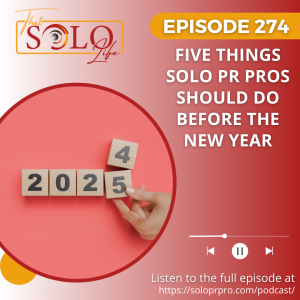
Monday Nov 11, 2024
Five Things Solo PR Pros Should Do Before The New Year
Monday Nov 11, 2024
Monday Nov 11, 2024
That Solo Life, Episode 274: Five Things Solo PR Pros Should Do Before The New Year
In This Episode
The final quarter of the year is here, and we are all sprinting toward the finish line. But before we close the books on 2024, there are a few things to do to prepare for 2025. In this episode of That Solo Life, co-hosts Karen Swim, APR and Michelle Kane cover five things to do (and think about) before we close the books on this year.
Karen and Michelle kick off the discussion by highlighting the Corporate Transparency Act and the BOI reporting requirements that came into effect this year. Many small business owners may not be aware of these obligations, so they emphasize the simplicity of the filing process and encourage listeners to complete it before the year ends.
The co-hosts then turn the focus to the importance of defining and understanding your values as business owners. Consumers increasingly prioritize corporate values in their buying decisions. This consideration is not limited to B2C companies but impacts B2B as well.Michelle and Karen discuss having a clear set of values for your Solo PR business. Values can guide decision-making and attract the right clients.
The conversation then moves to the critical topic of Key Performance Indicators (KPIs) and analytics. Listeners are urged to become comfortable with understanding how PR impacts client KPIs and using those metrics to demonstrate value.
Pricing models are evolving as companies adapt to marketing conditions. Michelle and Karen discuss the need for flexibility in pricing strategies, particularly in light of changing client needs and economic uncertainties. They discuss the need to have a range of pricing options available such as project-based pricing and flexible retainer options to better align with client expectations and your own financial stability.
Finally, the hosts address the integration of AI into our workflows. They discuss the importance of distinguishing between using AI as a tool versus relying on it to produce work independently. We emphasize the need for ethical considerations and transparency when using AI, as well as the importance of verifying information sourced through AI tools.
Throughout the episode, Karen and Michelle aim to equip listeners with actionable insights and strategies to navigate the complexities of running a solo business. They encourage everyone to take proactive steps, from filing necessary reports to refining pricing strategies, all while maintaining a focus on values and data-driven practices.
We hope you find value in our discussion and encourage you to share this episode with fellow PR pros and marketers. Don't forget to check out soloprpro.com for more resources to help you build a better business. Thank you for joining us on this journey, and we look forward to connecting with you in our next episode!
Episode Timeline
00:00:00 - Introduction and Q4 Reflection
00:01:30 - Corporate Transparency Act and BOI Reporting
00:05:04 - Understanding Your Values
00:10:45 - The Importance of KPIs and Analytics
00:15:12 - Pricing Strategies for 2025
00:20:22 - AI Disclosure and Ethical Use
00:21:33 - Conclusion and Call to Action
Resources:
- Corporate Transparency Act
- Beneficial Owner Information Filing
- AMEC Guide to Measurement
- G2 PR Measurement Post
- How to Create an AI Usage Policy
Enjoyed the episode?
Please leave a review here - even a sentence helps. Share and tag us (@SoloPR, @SoloPRPro) on social media so that we can thank you personally! Your support helps us keep bringing you insightful content every week. Thank you for tuning in!
